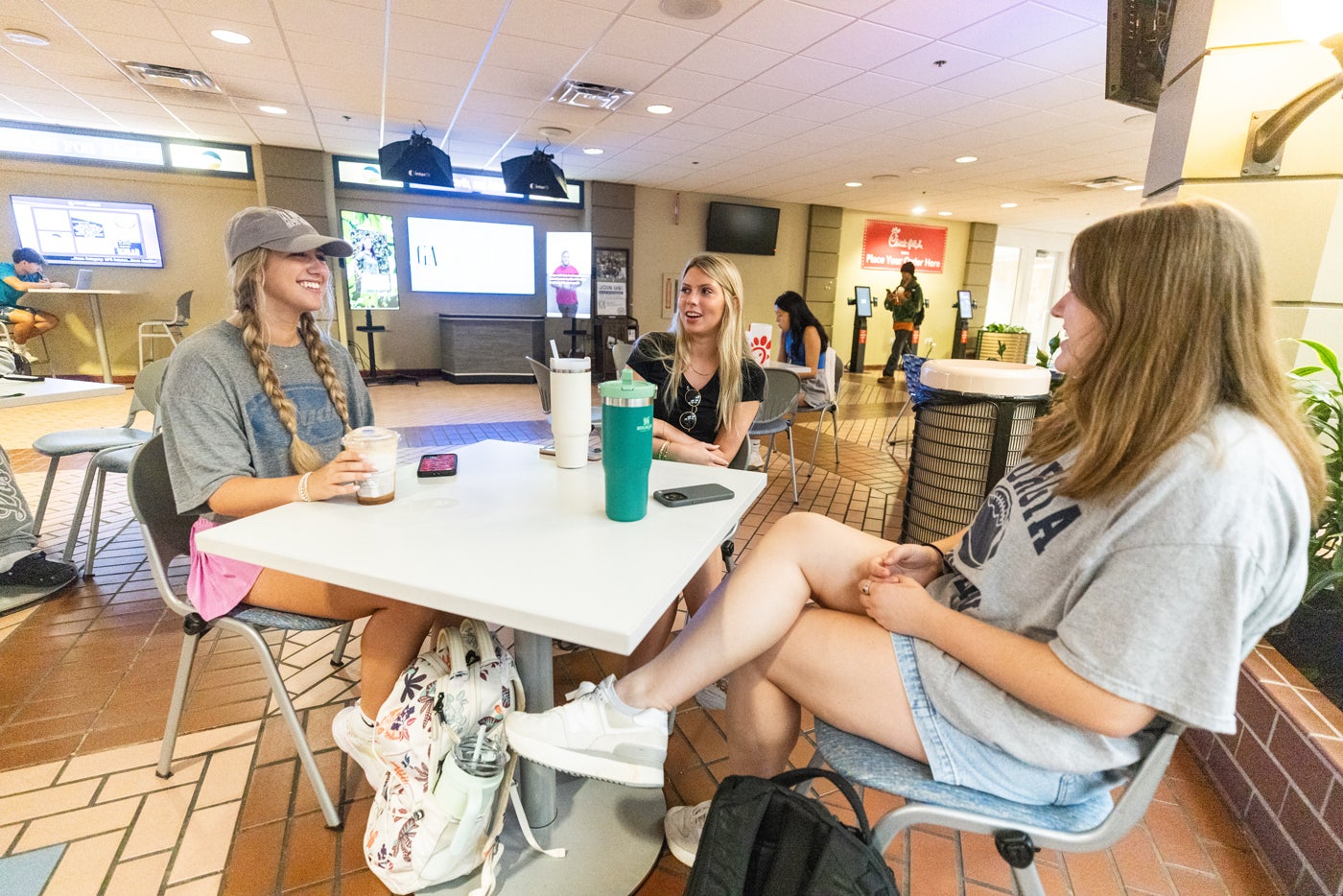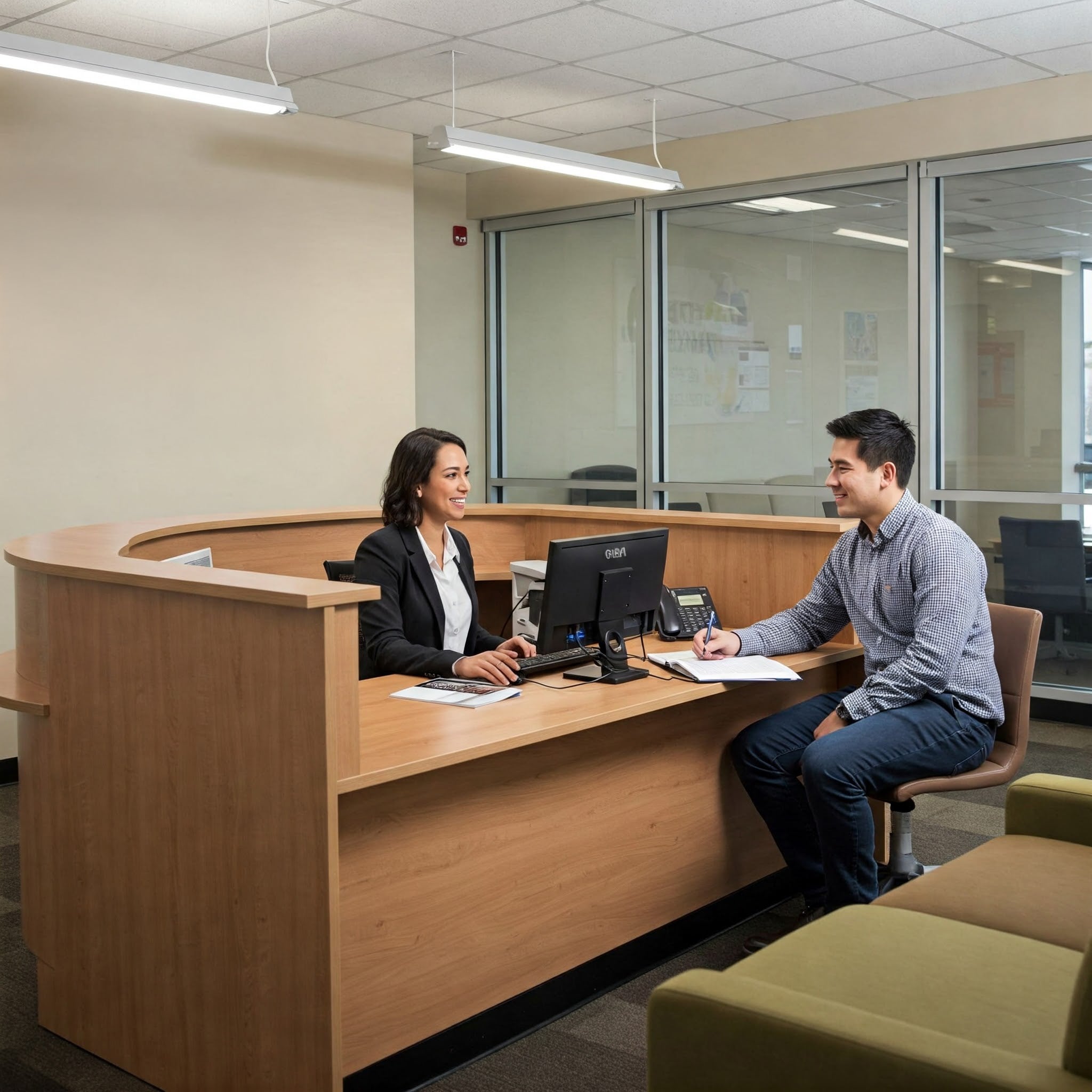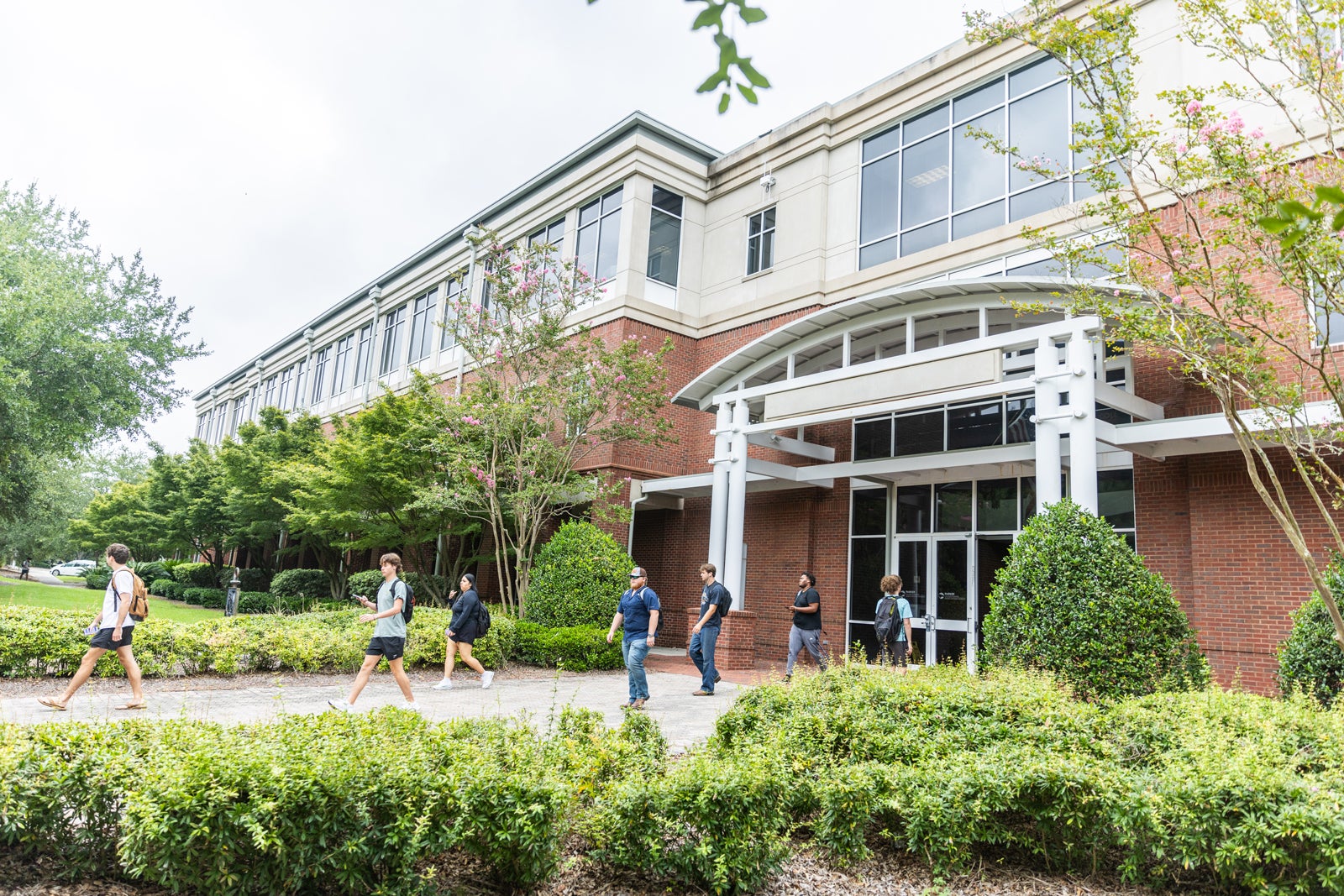At Georgia Southern University, we believe that student success is rooted in a strong foundation of personal responsibility, academic integrity, and community standards. The Office of Student Conduct supports these values by promoting a safe, respectful, and inclusive campus environment through education, engagement, and accountability.
Whether you’re a student, faculty, or staff member, our office is here to guide you through the conduct process, offer support, and ensure our Code of Student Conduct is upheld fairly and consistently.
Our Mission & Vision
Mission:
The Office of Student Conduct fosters an environment of learning and development through open and respectful dialogue, educational programming, and transformational sanctions. We uphold community standards that support wellness, growth, service, and inclusion across all Georgia Southern campuses.
Vision:
We strive to build a culture of accountability and integrity by promoting ethical behavior and empowering students to become responsible citizens in their communities—both during their time at Georgia Southern and beyond.
Our Goals
- Educate and inform the Georgia Southern community
- Promote civility and consistency through clear communication
- Engage students in meaningful and transformative interventions
- Empower students to take ownership of their actions and decisions
Report an Incident
Georgia Southern is committed to the safety and well-being of all students, faculty, and staff. If you witness or experience behavior that is concerning, disruptive, or potentially harmful, we encourage you to file an incident report.
Please note: Submissions are reviewed during regular business hours only. For emergencies, contact University Police.
- Statesboro: 912-478-5234
- Armstrong & Liberty: 912-344-3333
Examples of reportable behavior include:
- Significant changes in behavior or hygiene
- Violations of the Code of Student Conduct or law
- Suicidal ideation or mental health concerns
- Alcohol or drug abuse
- Classroom disruption

Code of Student Conduct
The Georgia Southern Code of Student Conduct outlines expectations for student behavior both inside and outside the classroom. It ensures that all students contribute to a safe, respectful, and academically focused environment.
Covered violations include (but are not limited to):
- Non-academic misconduct: Alcohol, drugs, harassment, threats, vandalism, interpersonal violence, etc.
- Academic misconduct: Cheating, plagiarism, fabrication, or assisting others in such acts.
Students are expected to uphold the dignity and integrity of the university at all times. Familiarity with the Code is essential to student success.
Recent Updates:
- Chapter Four – Amnesty Policy & Freedom of Expression
- Chapter Six – AOD Model Fees & Fines updates

Academic Dishonesty Reporting
Faculty should report all incidents of academic dishonesty using the dedicated form. Once submitted, our office will review prior history and guide the resolution process, which may involve informal or formal procedures.
Questions? Contact the Office of the Provost at provost@georgiasouthern.edu
Report Academic Dishonesty
Student Conduct Hearing Officers
Our team of Student Conduct Hearing Officers spans both the Statesboro and Armstrong campuses, including Graduate Assistants, Resident Directors, and Student Conduct administrators. Officers are trained to facilitate fair and educational conduct meetings.

Conduct Resources
We’re here to support students, faculty, and families throughout the conduct process. Explore helpful tools and links.
Classroom Disruption
What is classroom disruption? The Georgia Southern University Student Conduct Code defines classroom disruption as;
- Any classroom behavior that interferes with the instructor’s ability to conduct class, failure to conform to the faculty member’s announced expectations for the classroom, or the ability of other Students to learn.
- Use of cell phones or other electronic devices for voice or text communication in class, unless permitted by the faculty member.
View the Conduct Process and Classroom Disruption Faculty Guide for more information.
Report an IncidentBehavior Assessment Team
Any member of the campus community may become aware of a person of concern or situation that is causing serious anxiety, stress, or fear. It is the responsibility of faculty, staff, and students to immediately refer any situation that could possibly result in harm to anyone at the University. The Behavior Assessment Team (BAT) at Georgia Southern University meets regularly to assess and create action plans for students or student groups who present disturbing behavior in our community.
Learn MoreVictim Rights
As a student of Georgia Southern University, if you feel you are a victim of either a violation of the law or of the Code of Student Conduct, you have the following rights:
- Regardless of whether an act is in violation of the law, the Victim may file a report alleging a violation of the Code of Student Conduct.
- To have an advisor accompany them throughout the Student conduct process.
- To submit a Victim impact statement prior to a sanction being imposed.
- To have past unrelated behavior excluded from the hearing.
Helpful Modules
Boost your academic integrity and citation skills with our online learning modules. These quick, easy-to-follow resources help you understand how to avoid plagiarism and properly cite your sources—essential tools for success at Georgia Southern and beyond.
- Plagiarism Module – Learn what plagiarism is and how to avoid it.
- Citing Sources Module – Master citation styles and give proper credit in your academic work.
Parental Notification
Georgia Southern University is committed to the elimination of alcohol and drug abuse within the University community. The University is concerned with the safety and welfare of its students. The approach to violations of the alcohol and drug policy is designed to be pro-active. While the primary approach in response to alcohol and drug violations is educational, it should be clear that violations of the alcohol and drug policy would also result in disciplinary sanctions imposed by the University.
The Higher Education Reauthorization Act of 1998 (HERA) amended the Family Education Rights and Privacy Act (FERPA) to allow institutions of higher education to notify parents or legal guardians of students under the age of 21 the final outcome of an alcohol or drug violation. Therefore, it will be the policy of Georgia Southern University to notify parents or legal guardians of student under 21 years of age the final outcome of an alcohol or drug violation.
Possible Exceptions to The Policy
- The parents or legal guardians of students 21 years of age or older on the date of adjudication will not be notified.
- The parents or legal guardians of students under the age of 21 who are financially independent from their parents will not be notified.
- The parents or legal guardians of students under 21 years of age may not be notified in view of various social, religious, or cultural customs and practices, or under extraordinary circumstances. This will be determined on a case-by-case basis by the Office of Student Conduct in consultation with other offices within the Division of Student Affairs and Enrollment Management.
Georgia Southern University is an open records state. Written request for information under the Open Records Act will be forwarded to the Compliance Officer of the Open Records Act. (Effective Date: Spring Semester 2001)
Due Process Rights
What is classrooAny Student, Student Group, or Student Organization accused of a violation of the Code of Student Conduct will have the following rights:
- The right to request a copy of your individual Student Conduct Record.
- The right to not give testimony against oneself.
- In an Informal or Formal Resolution, the right to question any individual providing information to the University Student Conduct Board or Hearing Officer. Furthermore, in non-Title IX Hearings, the University reserves the right to provide alternative effective means of questioning a witness in cases where direct questioning is not possible or prevents the hearing from being conducted in a civil and orderly manner. In a Title IX Hearing, the cross examination will be conducted by the party’s advisor.
- To know the nature of the evidence against them and the names of witnesses scheduled to appear at a formal hearing.
- To receive a written statement of the Charges.
- To receive a fair and impartial hearing.
- To present evidence and witnesses on their own behalf.
- To be accompanied at a hearing by an advisor of their choice and up to two family members.
- To be present at the hearing during the presentation of any evidence or material on which a recommendation will be made. If a Student, Student Organization, or Student Group fails to attend the hearing, it will be held in their absence.
- To receive a decision based solely on the evidence presented.
- To receive a written notice of the decision and sanctions, including rationale for the decision from formal hearings.
- To appeal decisions resulting from a formal hearing.mation.
Appeals
Purpose
The purpose of an appeal is to review the procedures of a hearing in order to determine if there is a basis for error.
Grounds
A Student May Appeal a Student Conduct Decision on The Following Grounds:
- To Determine Whether the Original Hearing Was Conducted Fairly and In Conformity with Prescribed Procedures, Including Whether Any Hearing Questions Were Improperly Excluded or Whether the Decision Was Biased in Nature.
- To Determine Whether the Finding of The Case Was Consistent with The Weight of The Information.
- To Determine Whether New Information, Not Available to The Student at The Time of The Hearing, Is Relevant to Or Sufficient to Alter the Final Decision.
Procedure
The Appellate Officer Will Review All Material Related to The Case Including:
- The Record Made Before the Original Hearing Body
- All Pertinent Documents, Including Hearing Transcripts, Witness Statements, and Incident Reports
- Prior Violations and Sanctions Against the Student
Findings
The Appellate Officer May:
- Affirm the Findings and Sanctions.
- Affirm the Finding but Issue a New Sanction of Lesser Severity.
- Remand the Case Back to The Decision-Maker to Correct a Procedural or Factual Defect.
- Reverse or Dismiss the Case if There Was a Procedural or Factual Defect that Cannot Be Remedied by Remand.
Illegal Downloading Information
Why does the school have an illegal downloading policy?
The school wants to help protect you from negative consequences associated with downloading copyrighted material. Additionally, the school has a responsibility to abide by local, state, and federal laws and respect the copyrights and intellectual property rights of others, including copyrighted music and other materials.
What is the downloading policy?
The policy regarding downloading is not new, but there is new software that assists the university in monitoring illegal activity. Illegal downloading falls under the Unauthorized Use of Computer Resources policy in our Code of Student Conduct. This policy includes, but is not limited to “unauthorized transfer of a file,” “use of computing facilities that violate copyright laws,” and “any violation of the University’s computer use policies.”
What does this new software do?
Audible Magic monitors any computer and user ID connected to Georgia Southern University’s wireless or ResNet networks. The device’s function is to monitor all data traffic that it can see on the network, looking for data that matches the copyrighted content contained in a database of protected works. Publishers of media content register their works in Audible Magic’s database. Audible magic then reports and catches all infractions as they occur and immediately notifies the student that his/her illegal use of the network has been detected.
What does Audible Magic detect?
Audible Magic will detect all music, movies, and software that are contained in a database of protected copyrighted material. Also it will recognize signatures from over 150 popular P2P applications and their derivatives.
What if I have a downloading program on my computer but don’t use it?
If you have a peer-to-peer (P2P) client on your computer like “Bittorrent” or “Ares” that song could be uploading to someone else’s computer over the internet and activate Audible Magic. This is still a violation of school policy. Audible Magic catches all infractions that are downloads and uploads.
Will I be notified if I have illegal programs on my computer?
Yes. If you attempt to download illegal material you will first receive a warning message that asks you to stop the download and provides suggestions for legal alternatives such as BearShare, Rhapsody, Pandora, YouTube and more. On repeat offenses your access to the University network (through your individual User ID) will be disabled and you will be referred to the Office of Student Conduct.
For more information click here for a list of legal alternatives.
Student Leadership Opportunities
The Eagle Ethics Ambassador is a leadership role within the Office of Student Conduct. Students serving in this role will find a variety of opportunities to engage with our office as well as with students across campus. These ambassadors will serve on the University Student Conduct Board, an integral part of the Student Conduct process that allows students to have their case heard by a panel that includes their peer’s perspective. These student leaders will also assist in planning and facilitating programming initiatives and educational outreach with the Office of Student Conduct. These student leaders will have the opportunity to grow their leadership skills through regular leadership development workshops, mentor opportunities, and more! Eagle Ethics Ambassadors will also have the opportunity to earn service hours for the time and effort dedicated to the role.
The University Student Conduct Board (USCB) has the authority to hear cases involving alleged violations of the Code of Student Conduct. The USCB is comprised of faculty, staff and student members from the university community. When a student is accused of a violation of the Code of Student Conduct, they have the opportunity to have their cased resolved by an administrator in the Office of Student Conduct or choose to resolve it through the formal hearing process. One of these formal hearing options is the University Student Conduct Board.
University Student Conduct Board members, officers and representatives are responsible for providing a fair and unbiased process to address issues of student conduct. During hearings, the University Student Conduct Board will follow all operational guidelines and seek support and guidance from the University Student Conduct Board Chair when appropriate. Hearings are formal and confidential. The board will decide, in closed session, if the accused student should be found responsible or not based on the information presented via a majority vote. Sanctions imposed by the University Student Conduct Board will also be decided by majority vote.
Students can apply to serve on the University Student Conduct Board by applying to serve as an Eagle Ethics Ambassador and completing the application below! Students are selected through an annual application and interview process.
Faculty and Staff Members interested in serving on the USCB for the 2024-2025 academic year can submit their interest via this form.
All University Student Conduct Board members receive annual training from the Office of Student Conduct.
Recruitment for The Eagle Ethics Ambassador Program is OPEN! Applications can be found here!
Putting Students First
As a unit within the Division of Student Affairs, the Office of Student Conduct proudly supports the division’s mission to put STUDENTS FIRST. Through counseling, programming, and resolution services, we empower Georgia Southern students to grow into ethical, responsible, and civically engaged individuals.
If you have questions or need assistance navigating the conduct process, don’t hesitate to reach out. We’re here to help.
Office of Student Conduct
Statesboro Campus
Russell Union 2022
Phone: 912-478-0059
Fax: 912-478-7301
studentconduct@georgiasouthern.edu
Armstrong & Liberty Campuses
Student Union D206
Phone: 912-344-3300
Fax: 912-344-3475
armstudentconduct@georgiasouthern.edu
Meet Our Team
Dr. Zwisel Gandía
Associate Dean of Student Conduct & Community Standards
Russell Union 2070, Statesboro Campus
zgandiatorres@georgiasouthern.edu
Catherine Muse Walden
Assistant Dean of Student Care & Community Standards
Student Union D206, Armstrong Campus
cmuse@georgiasouthern.edu
Nicole Chernohorsky
Assistant Director of Student Conduct & Community Standards
Russell Union 2070, Statesboro Campus
Maria Elena Lealofi
Coordinator for Student Conduct
Russell Union 2070, Statesboro Campus
mlealofi@georgiasouthern.edu
Courtney Capps
Administrative Assistant II
ccapps@georgiasouthern.edu
Graduate Assistants:
- Additional positions currently vacant or to be announced.
- Kyrho Callis – Russell Union 2070, Statesboro Campus
- Jessica Paul – Student Union D206, Armstrong Campus
FAQs
The Office of Student Conduct in Statesboro is located in the Russell Union on the 2nd floor (room 2022) behind the large wooden doors and in the same suite as the Dean of Students Office.
The Office of Student Conduct in Armstrong is located in the Student Union on the 2nd floor (room D206) in the Student Affairs suite.
The Code of Student Conduct can be found online here.
You may file a report online here.
This form provides an avenue for all faculty, staff, and students to report disturbing or suspicious activity to the Dean of Students Office. Incidents can include (but not limited to):
- Violations of the Code of Student Conduct
- Violations of Law
- Suicidal Ideations
- Abuse of alcohol or other drugs
- Classroom Disruptions
- Drastic change in behavior/hygiene
Make sure that you click on the link and schedule a meeting with your hearing officer. It is important to attend your appointment. Be on time and please be prepared to discuss the incident. A decision on your situation has not been made yet, so it is important that you show up for the meeting to explain your side of the situation. If you fail to show a decision will be made in your absence.
If you have a legitimate excuses please contact the Office of Student Conduct to reschedule at 912-478-0059 for Statesboro and 912-344-2514 for Armstrong/Liberty.
If you are found responsible of an alcohol/drug violation and you are under the age of 21 your parents/guardians will receive a notification letter after the hearing and/or once a decision has been made.
Holds can be placed on an account for various reasons and can prevent you from registering for classes. Log onto your Wings for a description of what the hold means. If it is a conduct hold please refer to the description and complete your sanctions. If you are unsure what to do please contact our office and we will explain the reason for the hold to you.
Georgia Southern University has a 3 strike alcohol policy.
Yes, the Office of Student Conduct receives off-campus reports as well.
No, faculty members choose the academic penalty for their class which is typically stated in the syllabus as to how they would sanction students found responsible for academic dishonesty.
However, you may go to a formal board hearing to determine if you are responsible or not, but if found responsible through this process the faculty member’s academic penalty will stand.
The professor will enter a grade of “I”(Incomplete) and will submit a change of grade form once the final decision is made to reflect the appropriate grade earned in the course.
Yes, but only decisions made through a formal hearing officer or formal board. You can find out more information about the appeal process here.


